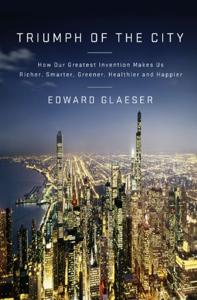
Want to learn the ideas in Triumph of the City better than ever? Read the world’s #1 book summary of Triumph of the City by Edward L. Glaeser here.
Read a brief 1-Page Summary or watch video summaries curated by our expert team. Note: this book guide is not affiliated with or endorsed by the publisher or author, and we always encourage you to purchase and read the full book.
Video Summaries of Triumph of the City
We’ve scoured the Internet for the very best videos on Triumph of the City, from high-quality videos summaries to interviews or commentary by Edward L. Glaeser.
1-Page Summary of Triumph of the City
Overall Summary
Edward Glaeser’s book, “Triumph of The City”, is a great look at the study of urban areas. He brings new life to the subject and adds controversy with his findings.
Glaeser argues that cities are important to the progress of humanity because they help generate good ideas and opportunities for people. He backs up his argument with evidence from his own research and other sources.
Cities have been the place where people go to share their ideas. Today, there are lots of leading urban centers for innovation such as Bangalore in India, Silicon Valley in California and New York City, Boston and London. They attract educated workers and small businesses that contribute to the economy by creating new goods or services. Some cities like Detroit lost their manufacturing jobs when factories did not need masses of laborers anymore. But some cities like New York and Boston managed a comeback because they were able to create an atmosphere where creativity thrived which led them to become centers for innovation with higher productivity rates than other areas that relied on industrialization alone. Education is key here because it helps foster creativity among workers who can then come up with innovative ways of doing things better as well as more prosperous ones.
Cities attract the poor because they offer better opportunities than rural regions. In a well-functioning city, poverty is a sign of success (the urban poor tend to rise out of poverty; they’re replaced by newcomers who follow in their footsteps). The best things that city leaders can do are provide clean water, sanitation, functioning transit systems, competent policing and good schooling. Western countries have seen disease and crime come down over the past century, so cities are safer than rural areas now.
The arts thrive in big cities. The entertainment and nightlife attract the best educated workers to a city, which is a selling point for that city. However, if there are too many restrictions on building new buildings then it will drive up the cost of living and make it difficult for artists to live there. Therefore, what should go up instead are high rises (skyscrapers) because they use less land per person than regular houses and therefore reduce the cost of living in a city.
There are policies that encourage people to move from cities to suburbs in the U.S., but those suburban housing options can cost a lot of money and may have long commutes. Meanwhile, greener states often limit construction, so housing demand moves to less environmentally friendly places. Urban neighborhoods reduce environmental impacts by being more densely built and having shorter commutes. They also provide greener entertainment options and wooded parks for residents who want better quality-of-life than what they get in the suburbs.
Every city is unique, and each succeeds in its own way. Some cities emphasize good governance and free markets; others feature excellent universities; still others offer urban pleasures. Many municipalities have become centers of finance and technology; some cities are known for the physical beauty of their location.
Cities that are successful need to be aware of misaligned policies that can harm them. Restrictions on trade and immigration also hurt cities by making them less vibrant. Furthermore, if developing countries copy Western policies, they will face increased environmental burdens.
Cities are idea factories that lead to increased productivity and improved opportunities for the poor. Cities are vital to human civilization, and public policy should support them.





